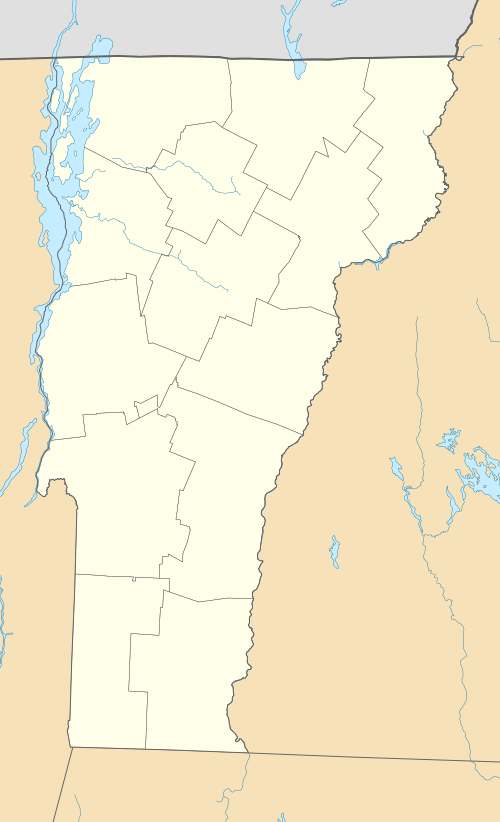Black River Academy
|
Black River Academy | |
|
| |
  | |
| Location | High St., Ludlow Village, Vermont |
|---|---|
| Coordinates | 43°23′47″N 72°41′45″W / 43.39639°N 72.69583°WCoordinates: 43°23′47″N 72°41′45″W / 43.39639°N 72.69583°W |
| Area | 0 acres (0 ha) |
| Built | 1835 |
| Architect | Smith,Clinton |
| Architectural style | Romanesque, Richardsonian |
| NRHP Reference # | 72000108[1] |
| Added to NRHP | November 15, 1972 |
The Black River Academy is a historic school building on High Street in the village of Ludlow, Vermont. Chartered in 1835, the school served as the town high school until 1938. The present building, a Richardsonian Romanesque structure built in 1888, was listed on the National Register of Historic Places in 1972 for its architectural and historic educational significance. It presently houses the Black River Academy Museum, operated by the Black River Historical Society.
Description
The Black River Academy building stands on the south side of High Street, a short way west of the Ludlow village green. It is a three story masonry structure, built out of load-bearing brick set on a granite foundation. It has a gabled roof with projection hip-roofed sections, and a four-story tower at one corner, topped by a truncated pyramidal roof. Windows are of a variety of sizes, but are generally set in round-arched openings. Bands of cut stone provide horizontal emphasis. The main entrance is in a deep recess under a round-arch opening. Roof lines of the main roof and tower feature corbelled brickwork at the eave.[2]
History
Black River Academy was chartered in Ludlow in 1835 and operated as a school, serving as the Town of Ludlow's public high school until 1938, when a new school was built. The original academy building burned early in the school's history, and the school operated in a church for 44 years until this building was built in 1888.[3][4][5] Notable alumni of the Black River Academy include U.S. President Calvin Coolidge; Rotary founder Paul P. Harris; John Garibaldi Sargent, who was U.S. Attorney General during Coolidge's presidency; Vermont Governor William W. Stickney; United States Senator Ernest Willard Gibson; and author and historian Abby Maria Hemenway.[4][6] After the school moved out, the building was used for a time as a convalescent home.
Since 1972, the building has housed the Black River Academy Museum, a museum of local history.[3][4]
See also
- Ludlow Graded School, located next door on the original 1835 academy site
- National Register of Historic Places listings in Windsor County, Vermont
References
- ↑ National Park Service (2009-03-13). "National Register Information System". National Register of Historic Places. National Park Service.
- ↑ "NRHP nomination for Black River Academy" (PDF). National Park Service. Retrieved 2016-06-03.
- 1 2 History of Black River Academy Archived January 8, 2011, at the Wayback Machine., Black River Academy Museum website, accessed October 9, 2009
- 1 2 3 Black River Academy, 14 High Street Archived July 25, 2011, at the Wayback Machine., Black River Academy Museum website, accessed October 9, 2009
- ↑ Black River Academy Museum and Historical Society Archived February 12, 2010, at the Wayback Machine., Vermont Museum and Gallery Alliance website, accessed October 9, 2009
- ↑ Some Famous Alumni of Black River Academy Archived January 19, 2010, at the Wayback Machine., Black River Academy Museum website, accessed October 9, 2009